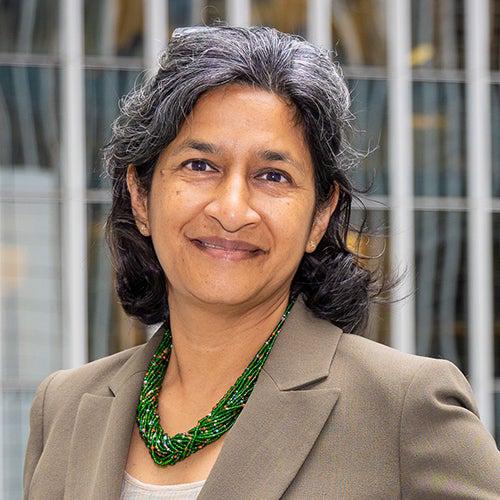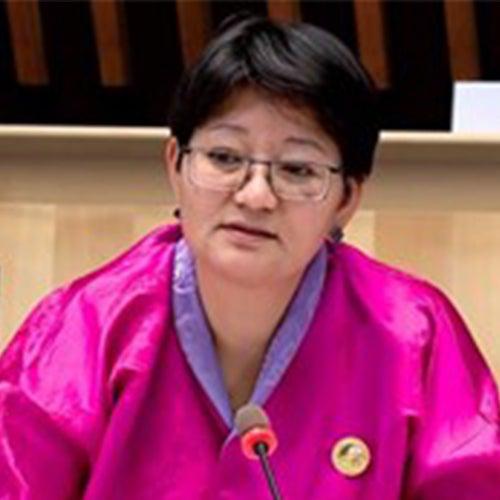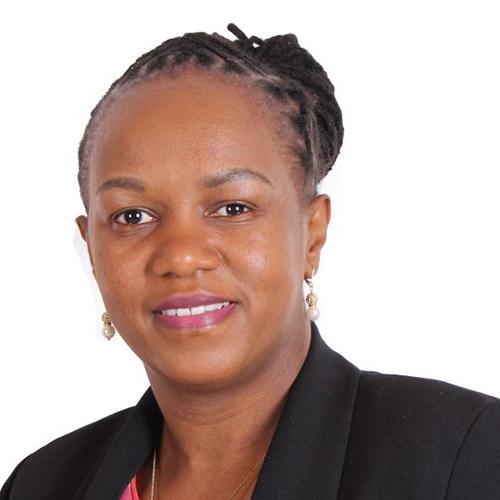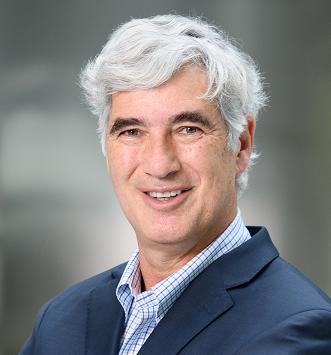Jing Guo (Moderator)
Hello everyone! Welcome to today’s event, Change Cannot Wait: Building Resilient Health Systems in the Shadow of COVID-19. We'll start the event in a few minutes. Please stay tuned and submit your comments and questions using the live chat.
You can join the conversation on social media using the hashtag #InvestInHealth. This event will also be live-streamed on our World Bank Twitter and YouTube accounts.
While we wait for the event to begin, we encourage you to read our new report, Change Cannot Wait: Building Resilient Health Systems in the Shadow of COVID-19, which was just published this morning. You can download it here: https://tinyurl.com/2s4zs59r
The report presents a new framework for strengthening health system resilience and shows where countries and partners can prioritize their investments to improve health outcomes.
Jing Guo (Moderator)
Welcome everyone! I’m Jing Guo, an external affairs officer with the World Bank. I will moderate today’s live chat together with our health experts, Akiko Kitamura (Health Specialist) and Shweta Sinha (Consultant) with the World Bank’s Health, Nutrition and Population Global Practice.
Please send your questions through the live chat on this page and join the conversation by using the hashtag #InvestInHealth on social media. Don’t forget to participate in our polls. To download the new report, please click here: https://tinyurl.com/y63m47ek
Jing Guo (Moderator)
Listed on this page you can see the speakers participating in today’s discussion. The event just started with a welcome message from Juan Pablo Uribe, World Bank's Global Director for Health, Nutrition & Population and the Global Financing Facility. Mamta Murthi, VP for Human Development at the World Bank, will provide opening remarks shortly.
Jing Guo (Moderator)
Fundamental change in health systems cannot wait, says Mamta Murthi, VP for Human Development at the World Bank.
zafar Abbas
COVID-19 showed the weakness of health systems in world. How can systems be incorporated to save the world from future pandemic shocks?
Akiko Kitamura/World Bank
'@zafar Abbas Thank you for sending the question. In order to address and be prepared for shocks in the future, several takeaways based on leassons learned from the COVID-19 experience are discussed in the report, one exmaple being going beyond the health sector. This effort includes, for example, establishing One Health platforms for coordination, joint planning and implementation of activities to strengthen resilience, the early engagement of the private sector, and innovation to catalyze health-system transformation. Please refer to the full report linked here https://tinyurl.com/y63m47ek
Jing Guo (Moderator)
Effective governance and partnerships are key to building health system resilience, says Mamta Murthi.
Jing Guo (Moderator)
Report authors Sulzhan Bali, Health Specialist and Zara Shubber, Senior Health Specialist at the Bank are now sharing the key findings and recommendations from the report.
Imane A
What are the main challenges for health systems in the world? Are they significantly different from a region to another?
Akiko Kitamura/World Bank
@ImaneA Thank you for your question. Following global economic shocks from the COVID-19 pandemic and the Russian invasion of Ukraine, the spending capacity of governments will decline or stagnate in many low- and lower middle-income countries. Without bold choices, these countries will be unable to make the necessary investment to strengthen public health preparedness and make progress toward universal health coverage. This will lead to growing inequalities between countries, threatening global stability, and prosperity. The report illustrates some of those examples.
David Gonzalez
How to raise funds in Health financing?
Akiko Kitamura/World Bank
@DavidGonzalez, thank you for your question. Governments must prioritize foundational, long-term investments in resilient health systems for all citizens in order to break the “panic and neglect” cycle. Most of this funding will need to be raised domestically. Yet World Bank research also shows that the projected increase in government health spending in 2026 will cover only about 60% of the necessary annual investment needed to strengthen and maintain public health preparedness and response capabilities in low- and lower middle-income countries. Considering this reality, significant international financing will be needed to support poorer countries.
Jing Guo (Moderator)
Again, you can download the new report, Change Cannot Wait: Building Resilient Health Systems in the Shadow of COVID-19, here: https://tinyurl.com/2s4zs59r.
“Resilient health systems are integrated health systems that are aware of threats and risk drivers; agile in response to evolving needs; absorptive to contain shocks; adaptive to minimize disruptions; and able to leverage lessons learned to transform after a crisis,” said the report authors.
The report also stresses that pandemic prevention, preparedness, and response (PPR) is integral to health system resilience (HSR). A country that is not prepared, cannot be resilient.
Keith M.
In Africa, many health facilities don't even have access to water, sanitation, or electricity. How is the Bank addressing these foundational challenges to health systems across the region?
Akiko Kitamura/World Bank
@Keith M. Thank you for your question. The World Bank is the single largest funder of the global COVID-19 health response with $14B committed to over 100 countries. Our $34B global health portfolio includes over 240 projects that help countries take a comprehensive approach to improving health outcomes, especially for poor and vulnerable people, by strengthening primary care and key public health functions. The World Bank is supporting countries in many other ways. For example, in Fiscal Year 2022, the Bank Group deployed a record $115 billion to help countries address rising food prices, manage refugee flows, bolster health preparedness, maintain private sector trade, and support efforts to mitigate and adapt to climate change.
Jing Guo (Moderator)
Our new report identifies several actions governments can take to make their health system more resilient. Some of the key areas include:
1. Investing in robust public health institutions and agile, evidence-based decision making for health crises
2. Improving awareness and early warning functions
3. Expanding community health workforce and building multi-disciplinary competencies for PPR
4. Prioritizing and tracking investments in PPR
5. Strengthening risk communication and community engagement
6. Investing in primary health care with integrated public health functions
7. Enhancing quality legal and regulatory frameworks
Jing Guo (Moderator)
Please send your questions through the live chat on this page and join the conversation by using the hashtag #InvestInHealth on social media. Don’t forget to participate in our polls. To download the new report, please click here: https://tinyurl.com/y63m47ek
Jing Guo (Moderator)
We are pleased to be joined by Dasho Dechen Wangmo, Minister of Health, Royal Government of Bhutan; Kwaku Agyeman-Manu, Minister of Health, Ghana; and Rosemary Mburu, CEO, WACI Health to have a panel discussion about how to build strong, resilient health systems.
Jing Guo (Moderator)
Kwaku Agyeman-Manu, Minister of Health, Ghana kicks off the discussion by sharing the types of investments his country made to help prevent disruptions to essential health services during the pandemic.
Dr Addis Kassahun
Do you think national health system resilience can be achieved without alignment and international collaboration?
Akiko Kitamura/World Bank
@Dr Addis Kassahun Thank you for your question. Following global economic shocks from the COVID-19 pandemic and the war in Ukraine, the spending capacity of governments will decline or stagnate in many low- and lower middle-income countries. The World Bank is committed to continue helping developing countries achieve universal health coverage through stronger, more resilient health systems and provide quality, affordable health services to everyone.
Jing Guo (Moderator)
Dasho Dechen Wangmo, Minister of Health, Royal Government of Bhutan, shares her country’s experience in delivering health services to vulnerable communities during the pandemic.
Fawad H
Hello from Pakistan. Do you have examples of projects led by local communities that contributed to improving health systems' efficiency?
Shweta Sinha, World Bank
@Fawad H Thank you for your question. The report has a dedicated chapter on risk communication and community engagement and how it is contributing to health system resilience. Examples from several countries highlight the engagement of communities in communication, information management, etc. There are also community engagement success stories from many countries. You can download the report here: https://www.worldbank.org/...
Alexis Doss
How has health financing been impacted by COVID around the world? Do you see more public-private partnerships or more comprehensive governmental structures, or a conglomeration of both?
Akiko Kitamura/World Bank
@Alexis Doss Thank you for your question. Following global economic shocks from the COVID-19 pandemic and the war in Ukraine, the spending capacity of governments will decline or stagnate in many low- and lower middle-income countries. Building resilient health systems requires strong, sustainable health financing that encompasses preparedness and emergency response. We included some of the key recommendations specific to this domain in the presentation today and the report.
Jo Keatinge
My concern about our narrative on resilience is that is talked about in terms of being required for the 'next pandemic' when we need this to manage ongoing outbreaks of infectious diseases e.g. Ebola, cholera, measles etc. There is therefore an urgency to fix and address the bottlenecks now to improve health outcomes now.
Jing Guo (Moderator)
Resilience to health shocks and public trust are closely interlinked. Rosemary Mburu, CEO, WACI Health discusses how countries can better build public trust to enable health system resilience.
Jing Guo (Moderator)
Please send your questions through the live chat on this page and join the conversation by using the hashtag #InvestInHealth on social media. Don’t forget to participate in our polls. To download the new report, please click here: https://www.worldbank.org/...
Adi Bar
Prioritizing health needs in countries that suffer from deficiencies in all aspects of healthcare system is challenging. What should a company aimed at offering healthcare solutions (such as building PHC clinics, hospitals, etc.) to SSA countries focus on moving forward?
Akiko Kitamura/World Bank
@Adi Bar Thank you for the question, indeed, the private sector engagement is one of the key recommendations in the report. The government health sector bears primary responsibility for fostering health system resilience. However, the private sector, both health and commercial sectors, has an extensive range of capabilities and resources that can contribute to resilience, and private actors are often willing and ready to engage. Although in many countries the private sector has yet to be effectively enlisted in resilience efforts, the COVID-19 response provides evidence of promising public-private collaboration.
Jing Guo (Moderator)
Ghana has been recognized in Sub-Saharan Africa for its innovation in building its COVID-19 testing capacities. Minister Kwaku Agyeman-Manu shares how this innovation was key to building a stronger health system in this country.
MohamedOkba
My question is how the world bank can push in the direction of implementation of the world health policies and Health Economics in LMICs?
Akiko Kitamura/World Bank
@MohamedOkba Thank you for your question. The World Bank is committed to supporting developing countries to achieve universal health coverage through stronger, more resilient health systems and providing quality, affordable health services to everyone – especially to the most vulnerable during a time of crisis. Crisis preparedness is integral to the mission of the organization and we are committed to supporting countries on this agenda by scaling up our country and regional efforts.
Jing Guo (Moderator)
Facing the overlapping crises of the pandemic, climate change and rising fragility and conflict, countries need to make tough decisions about where to allocate their limited financial resources. Dasho Dechen Wangmo, Minister of Health, Royal Government of Bhutan, discusses where countries should invest most to achieve efficiency and resilience.
Allavo prosper
How can countries especially poor ons build build resilient health systems?
Shweta Sinha, World Bank
@Allavo Prosper Thank you for your question. The report presents several examples from across the world where countries with limited resources were able to invest in a stronger and more resilient health system. There are an array of options, within reach of all countries, to strengthen resilience.
Jing Guo (Moderator)
Rosemary Mburu, CEO, WACI Health underscores the importance of community engagement in crises responses. She shares some of the best practices in community engagement to help address misinformation and ensure compliance.
Panna k. B
How can developing countries not depend on foreign aid to build more resilient health systems?
Akiko Kitamura/World Bank
@Panna k. B Thank you for the question. Health budgets are becoming more limited following the COVID-19 crisis response. The report identifies several actions governments can take to make their health system more resilient, including investing in robust public health institutions and agile, evidence-based decision making for health crises; improving awareness and early warning functions; expanding community health workforce and building multi-disciplinary competencies for PPR; prioritizing and tracking investments in PPR, strengthening risk communication and community engagement; investing in primary health care with integrated public health functions, and enhancing quality legal and regulatory frameworks.
Jing Guo (Moderator)
We have a wonderful group of panelists today. Speaking right now is Feng Zhao, Practice Manager, Health Nutrition and Population, South Asia Region, World Bank.
shete
Most of the african countries do not have effective and efficient public health care insurance that allows citizens to access health services free of charge especially in emergency cases. How can the countries be supported to establish effective and efficient health care insurance for its citizens?
Shweta Sinha, World Bank
@Shete Thank you for your question. One of the important components that a resilient health system builds upon is access to health coverage. The report presents a unique and simple health system resilience framework and a detailed roadmap for countries to progress toward Universal Health Coverage (UHC).
Jing Guo (Moderator)
Thank you everyone for joining us today. Again, please send your questions through the live chat on this page and join the conversation by using the hashtag #InvestInHealth on social media. Have you taken the poll yet?
To download the new report, please click here: https://www.worldbank.org/...
Jairo Ouma Jura
What agile-focused solutions and programs should we expect from the World Bank to mitigate potential future public health challenges like COVID-19 by 2027?
Akiko Kitamura/World Bank
Thanks JairoOumaJura for your question. Crisis preparedness is integral to the mission of the World Bank Group, and we have long been supporting developing countries in building stronger health systems. for example, in Africa, through our Regional Disease Surveillance systems Enhancement (REDISSE) and the Regional Sahel Pastoral Support projects, we are helping to improve Regional cooperation on public health, to upgrade veterinary laboratories and to prevent antimicrobial resistance. our investment project to Support the Africa Centres for Disease Control and Prevention is enhancing Disease detection capability and enabling health authorities in the region to pool resources.
the new Financial Intermediary Fund for pandemic Prevention, preparedness, and Response— housed at the World Bank and working in close collaboration with the World health Organization - is a further, important step to help strengthening country systems, so that the World is better prepared for future pandemics.
Jing Guo (Moderator)
Juan Pablo Uribe, World Bank's Global Director for Health, Nutrition & Population and the Global Financing Facility concludes today’s discussion. Thank you to everyone for your comments, questions, and ideas. You can continue the conversation with us in the following ways:
• Use Twitter with the hashtag #InvestinHealth
• Follow us @WBG_Health on Twitter
• Subscribe to the World Bank’s health blog, Investing in Health: https://blogs.worldbank.org/health
• Learn more about the report, please visit: https://tinyurl.com/y63m47ek
• Visit us at www.worldbank.org/health
to learn more about the World Bank’s work on health. Our $34 billion global health portfolio includes over 240 projects that help countries take a comprehensive approach to improving health outcomes, especially for poor and vulnerable people, by strengthening primary care and key public health functions.
Huge thanks to our speakers, panelists, and moderators who shared their insights with us today. Please check back soon for a recording of the event, which will be made available on this page.











